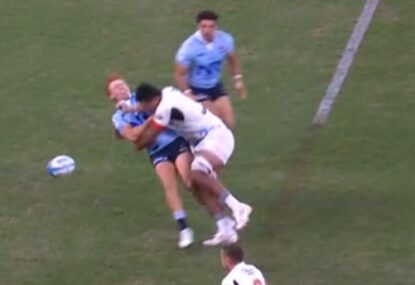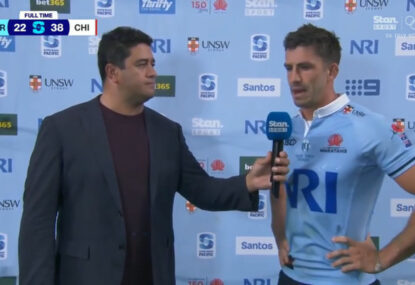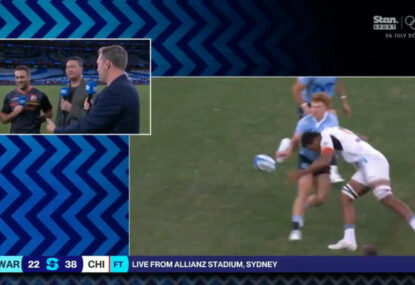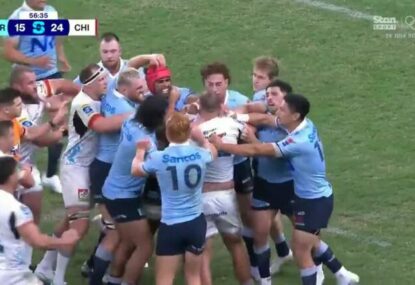The make-up and leadership of the International Rugby Board has for a long time now, not been representative of the needs of the wider rugby world. Yet the IRB is supposed to be proactive in promoting rugby worldwide.
This is the view of Prime Minister Tuilaepa Sailele Malielegaoi, who is also chairman of the Samoa Rugby Union.
While cashed-up Tier One rugby nations have poured tens of millions of dollars and Euros into preparing their rugby sides for next month’s World Cup, small rugby nations Fiji, Tonga and Samoa are struggling.
“For six weeks now, we’ve been trying to raise $4.5 million tala (1 million Euros) to fully prepare our team for New Zealand,” said Tuilaepa.
“Samoa is a small, and by far, not a rich country. We’ve been going to the countryside, virtually begging businesses and grassroots people – who don’t have much to give anyway – to contribute to our World Cup campaign. And many donated only $2.00 because that is all they have.
“We’ve also asked our brothers and sisters in American Samoa New Zealand and Australia for their help. Manu Samoa also represents them and they’ve donated very generously.
“This while teams like Wales, Scotland, England, France, Ireland, New Zealand, Australia and South Africa are virtually swimming in money. The rugby world is a very lopsided world in terms of resources and player-base.”
The fact that the Celtic nations – who make up the majority of IRB membership – have blanketly refused players from switching countries to play for, unconditionally, is also hurting the national representations for the three Pacific Island Nations.
“For Samoa, we don’t have that many rugby players. The fact that the SANZA – New Zealand, Australia and South Africa – nations have also virtually stopped players who are committed to play for the islands in their Super Rugby competition, has also essentially shut the door not only for the development of our elite rugby players but securing professional contracts for them. Only a very few lucky ones make it to the professional competitions in Europe and Japan.”
And all the rugby money is in Europe.
“Every time the Southern Hemisphere teams tour Europe, the European rugby unions keep all the gate takings and vice versa. This is the law that existed in the amateur days of rugby but is still being observed today when the sport has turned professional. And as long as this imbalance remains, global rugby will be the poorer.”
No doubt, Tuilaepa added, the IRB will be making hundreds of millions of dollars again after next month’s world cup.
“And the Northern Hemisphere nations will still dominate the IRB because Great Britain has three votes, the only country with three nations teams in the World Cup – Wales Scotland and England – in place of what should be the British Lions! That’s British justice at the IRB!”
“The next Commonwealth Heads of Government Meeting (CHOGM) slated for Perth in October should address the issue of good governance in the Administration of this popular Commonwealth Sport!”
If it wasn’t for the three Pacific islands, the Prime Minister said, rugby sevens would not be an exciting sport.
“This arrogance in the twenty-first century is unthinkable to exist in a sport propagated in the Commonwealth where the UK is supposed to be the champions of justice, fairness and equality.
It is heartening that thanks to Olympics justice, with Rugby Sevens now accepted as an Olympic sport, the UK will have only one team not three.
“The biggest selling point for the rugby sevens to the Olympics is that small countries – like Fiji, Samoa and Tonga – who normally don’t win Olympic medals, do so well at rugby sevens. In many ways, we have helped rugby grow as a truly global sport, thus, continuing to make the IRB very rich.”
But the opening of the High Performance Unit (HPU) in Tuanaimato last Friday – funded by the IRB – is not lost on the Prime Minister.
“We are thankful for this initiative. But, there is no point in developing rugby talents if there is no clear and reasonable pathway for them to secure professional contracts, to earn an income from playing rugby. This is where the IRB should come in. We have players on par – if not better – than many playing Super rugby or professional rugby in Japan and Europe. We need our players to be regularly exposed to high-level professional competition and training.
“In terms of player eligibility, we see nothing wrong with a player with Samoan roots switching to play for Manu Samoa – if they are not picked by the country they first played for. All impediments to freedom of movement if a player is not selected should be removed. I fail to see how that will hurt international rugby.
“In fact, it will strengthen international rugby. There are many young and talented Samoan, Fijian and Tongan players who can never play international rugby again after briefly appearing for the All Blacks. Some, for just a few minutes on the field.
“That is just blatant unfair. In fact, it seems this is a favourite ploy to deliberately deny a player with potential to ever again entertain playing for Samoa, Tonga or Fiji.
“Samoa has a very different perspective towards its people. Because Samoa is not only a country or a flag, but also a distinct ethnicity, a distinct culture and a distinctive heritage. Where your parents migrate and where you are born and raised is something that is beyond your mortal control. Tens of thousands of Samoans have been migrating to New Zealand since the 1950s and the tens of thousands more of their children, are born in that country. And they cannot be denied their Samoan ethnicity, their Samoan culture and their Samoan heritage. It’s their birth right.
“If the rules were relaxed today, Samoa will welcome with open arms any Samoan or American Samoan rugby player on the planet who wishes to try out for the Samoa rugby team. Manu Samoa will be stronger, and rugby in the end, will be the real winner.”


































































































